Suchergebnisse für "Factsheet: Energietechnologien gestalten, die für alle sinnvoll und nutzbar sind"
Energiespeicher Beton: Thermische Bauteilaktivierung. Planungsleitfaden Einfamilien- und Reihenhäuser
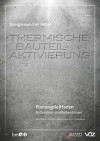
Schriftenreihe
9/2016
Felix Friembichler, Simon Handler, Klaus Krec, Harald Kuster
Herausgeber: BMVIT
Deutsch, 122 Seiten
Downloads zur Publikation
Stadt der Zukunft - 3. Ausschreibung
Move2Grid - Umsetzung regionaler Elektromobilitätsversorgung durch hybride Kopplung
Aufbauend auf den Ergebnissen der „Stadt der Zukunft“ Sondierungsprojekte „Smart Exergy Leoben“, und „Energieschwamm Bruck“ soll im gegenständlichen,umsetzungsorientierten Forschungsvorhaben anhand des Beispiels Leoben untersucht werden, wie mit regionalen, erneuerbaren Ressourcen regionale Elektromobilität langfristig versorgt, optimal ins kommunale Verteilernetzsystem integriert und ökonomisch nachhaltig implementiert werden kann.
solSPONGEhigh - Hohe solare Deckungsgrade durch thermisch aktivierte Bauteile im urbanen Umfeld
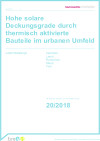
Im Forschungsprojekt solSPONGEhigh wurde die intensive Nutzung von thermisch aktivierten Bauteilen (TABs) als zusätzlicher thermischer Speicher in verschiedenen Gebäuden unter vorrangigem Einsatz von Solartechnologien untersucht. Die Arbeitshypothese ging davon aus, dass durch die Aktivierung und Nutzung der bauteilimmanenten thermischen Speicher eine Deckung des Gebäudeenergiebedarfs mit Solartechnologien von bis zu 100 % erreicht werden könnte.
Schriftenreihe
20/2018
Heimrath, Lerch, Ramschak, Mach, Fink
Herausgeber: BMVIT
Deutsch, 112 Seiten
Downloads zur Publikation
Stadt der Zukunft - 1. Ausschreibung
Raum & Grün - Möglichkeiten zur Integration von Begrünung ins Regelwerk der österreichischen Raumordnung
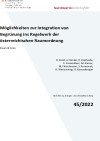
In der F&E-Dienstleistung „Raum & Grün“ wurde eine Studie erstellt, welche die Zusammenhänge zwischen Raumordnung und Begrünung abbildet, den Handlungsbedarf sowie -spielraum von Akteurinnen und Akteuren zeigt sowie konkrete Empfehlungen formuliert, wie innovative Stadtbegrünungen und Bauwerksbegrünungen effektiv in das Regelwerk der österreichischen Raumordnung und Raumplanung verankert werden können.
Schriftenreihe
45/2022
B. Knoll, A. Renkin, R. Dopheide, E. Knasmillner, M. Karner, M. Fleischmann, S. Formanek, R. Werluschnig, G. Kienastberger
Herausgeber: BMK
Deutsch, 92 Seiten
Downloads zur Publikation
GreenTech-Renovation - Energetische Sanierung von gläsernen Gebäuden von architektonischem Wert
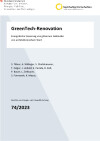
Der Schwerpunkt des Projekts GreenTech-Renovation war, innovative Lösungen zur energetischen Sanierung von architektonisch wertvollen Bauten mit hohen Glasanteil zu finden. Dafür wurde ein zukunftsweisendes bauphysikalisches Konzept entwickelt, das den Einsatz alternativer Energieformen beinhaltet. Ein intelligentes Nutzungskonzept kann mit ökologischem und sozialem Engagement die energetischen Sanierungskonzepte verstärken und deren Nachhaltigkeit garantieren. Die 10-R der Kreislaufwirtschaft (Refuse, Rethink, Reduce, Reuse, Repair, Refurbish, Remanufacture, Repurpose, Recycle, Recover) dienen dabei als Leitlinie.
Schriftenreihe
74/2023
S. Tillner, A. Willinger, S. Stockhammer, T. Zelger, J. Leibold, E. Paráda, D. Bell, P. Bauer, L. Zeilbauer, S. Formanek, K. Mauss, B. Lipp, T. Dobra
Herausgeber: BMK
Deutsch, 152 Seiten
Downloads zur Publikation
MADOKLI - Mannersdorf climate fit! Using local resources to combat and adapt to climate change for a climate-neutral neighbourhood
Development of a climate-neutral neighbourhood by integrating previously unused heat sources and sinks, such as the underground Mühlbach stream, to supply municipal buildings, to establish use-oriented water management and to develop solutions for climate-friendly outdoor spaces in the centre of Mannersdorf am Leithagebirge.
Optimierung der SOLARenergienutzung in URbanen Energiesystemen (URSOLAR)
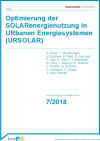
URSOLAR stellt EntscheidungsträgerInnen eine Roadmap zur integrierten urbanen Solarenergie-nutzung zur Verfügung. Es wird aufgezeigt, wie Photovoltaik (PV) und Solarthermie angepasst an infrastrukturelle und rechtliche Gegebenheiten in idealtypischen Stadtquartieren aus ökonomischer, ökologischer und sozialer Sicht sowie unter Berücksichtig von Stakeholder-Interessen optimal ge-nutzt werden können.
Schriftenreihe
7/2018
A. Posch, T. Brudermann, M. Buchner, E. Fleiß, D. Geringer, P. Hart, S. Hatzl, T. Kallsperger, G. Lang, T. Mayrold, E. Meißner, C. Reischl, G. Schnedl, S. Seebauer, K. Stöger, A. Würz-Stalder
Herausgeber: BMVIT
Deutsch, 137 Seiten
Downloads zur Publikation
BIPV-Booster - Game changer for façade-integrated PV systems: Development of proof-free constructions regarding fire protection
The central result of the project will be the development of a catalogue of “proof-free constructions” with regard to fire protection for façade-integrated photovoltaic systems, particularly for the more difficult case of high-rise buildings. These constructions will be defined in the project and tested in fire tests. The fire tests are to be supplemented by electrical and material-related module tests before and after the fire tests.
LehB:KlimafitDemo2+1 - Living in existing buildings today: climate-friendly renovations in existing buildings within the framework of the common good housing law
The LehB:KlimafitDemo2+1 project examines innovative renovation solutions for the climate-fit modernization of non-profit residential buildings without placing a financial burden on tenants. By implementing a flexible modular system and involving the residents, economic, technical and social aspects of the renovation are optimized. The aim is to make an important contribution to achieving climate neutrality by 2040 through adapted measures and comprehensive monitoring.
Umsetzung regionaler Elektromobilitätsversorgung durch hybride Kopplung (Move2Grid)
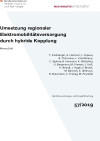
Aufbauend auf den Ergebnissen der „Stadt der Zukunft“ Sondierungsprojekte „Smart Exergy Leoben“, und „Energieschwamm Bruck“ soll im gegenständlichen,umsetzungsorientierten Forschungsvorhaben anhand des Beispiels Leoben untersucht werden, wie mit regionalen, erneuerbaren Ressourcen regionale Elektromobilität langfristig versorgt, optimal ins kommunale Verteilernetzsystem integriert und ökonomisch nachhaltig implementiert werden kann.
Schriftenreihe
57/2019
T. Kienberger, A. Hammer, J. Vopava, B. Thormann, L. Kriechbaum, C. Sejkora, R. Hermann, K. Watschka, U. Bergmann, M. Frewein, J. Koß, H. Brandl, J. Vogel, S. Moser, M. Baresch, K. de Bruyn, R. Braunstein, C. Freitag, M. Peyreder
Herausgeber: BMVIT
Deutsch, 172 Seiten
Downloads zur Publikation
KliB40-Climate Compass: Climate-neutral Bregenz 2040, climate compass for the structured participation of stakeholders and the citizens
The "KliB40 Climate Compass" supports Bregenz on its path to climate neutrality by 2040 through transparent development, selection, and monitoring of measures. It facilitates the coordination of climate protection activities and actively involves stakeholders. By evaluating existing software solutions, the project ensures optimal digital support for planning and implementing the city's climate strategy.
ELEMENTS - Development of a procedure for the evaluation of elements of the post-war building stock (1960 - 1979) in Graz, Austria
Investigation of the building stock constructed in Graz between 1960 and 1980 with the aim of creating the basis for developing a potential analysis procedure regarding its preservation and refurbishment. Stakeholders, including those from the fields of planning and building practice, will be involved in the development of the results.
HEATbucket - Urban underground thermal energy storages to enable energy transition
In urban areas, the heat supply and cooling of buildings is one of the key challenges in the course of the energy transition. With HEATbucket, a structural engineering solution is to be investigated for the realisation of underground heat storage in built-up areas. In addition to the technical challenges, the focus is on the general feasibility and the impact on the subsoil and groundwater.
Tariffs4all - Participation of the citizens from Bruck in the energy transition for all
The project responds to the challenges of participation in the energy transition in the municipality of Bruck/Mur by exploring the possibilities of Power Purchase Agreements (PPAs), Peer to Peer Trading (P2P Trading) and virtual metering points for generation plants be developed and implemented as a basis for new tariff/financing models.
sewageENERGYrecovery - Performance comparison of different wastewater heat recovery systems for renewable heat generation
Independent detailed testing of the performance and efficiency of different wastewater heat recovery systems in actual operation by analysing measurement data. Evaluation of the analysed systems with regard to their optimal application possibilities.
SIMPLE AD Evaluator - S.I.M.P.L.E. Sustainable Integration Modeling and Predictive Leveraging Evaluator
The SIMPLE AD Evaluator fills an existing gap in sustainable local planning by providing a low-threshold and collaborative evaluation tool for early planning phases. By linking questionnaires with System Dynamics models, the tool delivers well-founded decision-making foundations and customized sustainability checklists. This supports municipalities, project developers, and decision-makers in achieving a strategic and cost-efficient sustainable transformation from concept to implementation.
NEBKrit - Quality criteria for buildings and neighbourhoods on the basis of the New European Bauhaus
Develop criteria of aesthetics and social inclusion based on the values of the New European Bauhaus to complement existing sustainability criteria in order to evaluate buildings and neighbourhoods more broadly. Since todayʼs necessary transformation of the economy always includes cultural and social aspects, such a broader assessment makes more sense than todayʼs usual methods.
ProzesSan - Development of processes to increase the decarbonisation and refurbishment rate in the housing sector
The project aims to assist owners of large property portfolios with the challenges of refurbishing their buildings. The first step is to identify the various obstacles and develop appropriate solutions. These will be tested in three workshop phases with the owners, and a workshop manual and guidelines will be developed.
